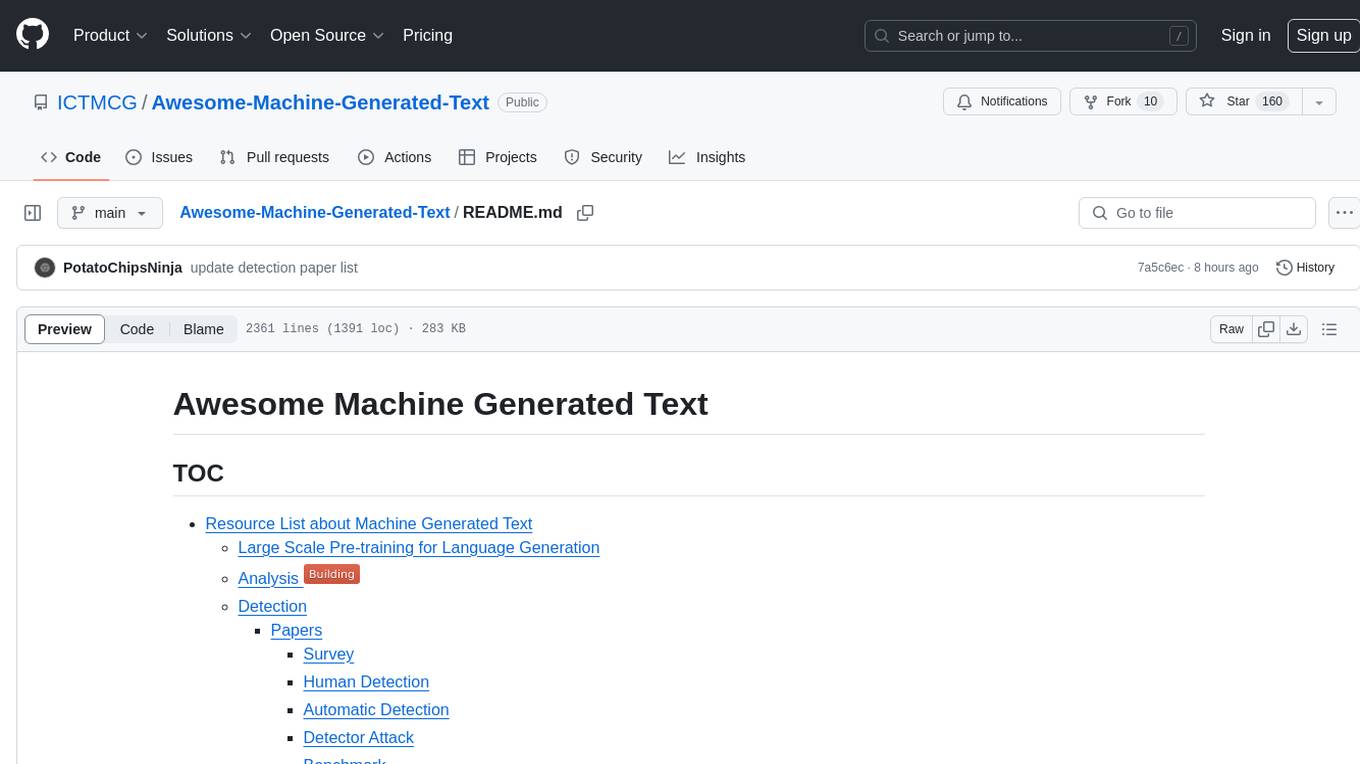
AI-resources
Selection of resources to learn Artificial Intelligence / Machine Learning / Deep Learning
Stars: 220
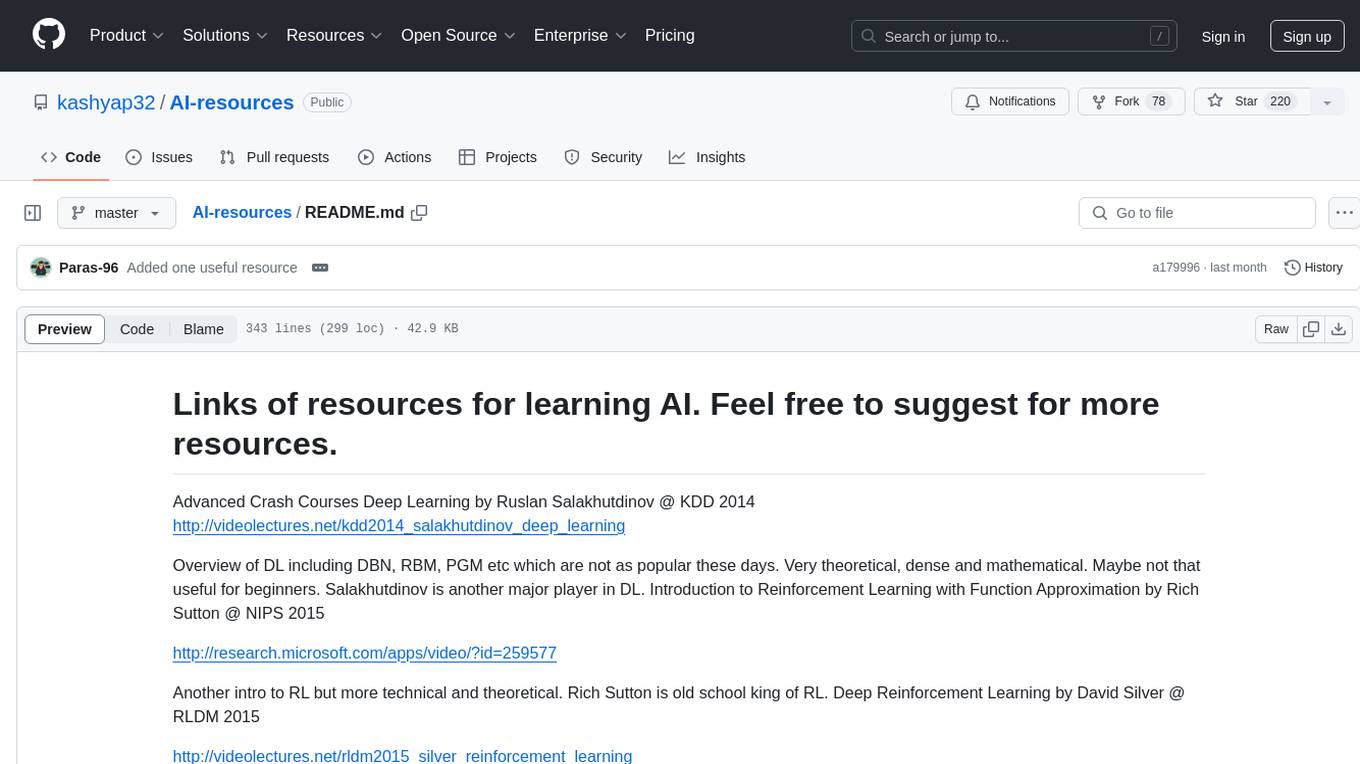
AI-resources is a repository containing links to various resources for learning Artificial Intelligence. It includes video lectures, courses, tutorials, and open-source libraries related to deep learning, reinforcement learning, machine learning, and more. The repository categorizes resources for beginners, average users, and advanced users/researchers, providing a comprehensive collection of materials to enhance knowledge and skills in AI.
README:
Advanced Crash Courses Deep Learning by Ruslan Salakhutdinov @ KDD 2014 http://videolectures.net/kdd2014_salakhutdinov_deep_learning
Overview of DL including DBN, RBM, PGM etc which are not as popular these days. Very theoretical, dense and mathematical. Maybe not that useful for beginners. Salakhutdinov is another major player in DL. Introduction to Reinforcement Learning with Function Approximation by Rich Sutton @ NIPS 2015
http://research.microsoft.com/apps/video/?id=259577
Another intro to RL but more technical and theoretical. Rich Sutton is old school king of RL. Deep Reinforcement Learning by David Silver @ RLDM 2015
http://videolectures.net/rldm2015_silver_reinforcement_learning
Advanced intro to Deep RL as used by Deepmind on the Atari games and AlphaGo. Quite technical and requires decent understanding of RL, TD learning and Q-Learning etc. (see RL courses below). David Silver is the new school king of RL and superstar of Deepmind’s AlphaGo (which uses Deep RL). Monte Carlo Inference Methods by Ian Murray @ NIPS 2015
http://research.microsoft.com/apps/video/?id=259575
Good introduction and overview of sampling / monte carlo based methods. Not essential for a lot of DL, but good side knowledge to have. How to Grow a Mind: Statistics, Structure and Abstraction by Josh Tenenbaum @ AAAI 2012 http://videolectures.net/aaai2012_tenenbaum_grow_mind/
Completely unrelated to current DL and takes a very different approach: Bayesian Heirarchical Models. Not much success in real world yet, but I’m still a fan as the questions and problems they’re looking at feels a lot more applicable to real world than DL (e.g. one-shot learning and transfer learning, though Deepmind is looking at this with DL as well now). Two architectures for one-shot learning by Josh Tenenbaum @ NIPS 2013 http://videolectures.net/nipsworkshops2013_tenenbaum_learning
Similar to above but slightly more recent.
Optimal and Suboptimal Control in Brain and Behavior by Nathaniel Daw @ NIPS 2015 http://videolectures.net/rldm2015_daw_brain_and_behavior
Quite unrelated to DL, looks at human learning — combined with research from pyschology and neuroscience — through the computational lens of RL. Requires decent understanding of RL. Lots more one-off video lectures at: http://videolectures.net/Top/Computer_Science/Artificial_Intelligence
http://videolectures.net/Top/Computer_Science/Machine_Learning/
Massive Open Online Courses (MOOC) These are concentrated long term courses consisting of many video lectures. Ordered very roughly in the order that I recommend they are watched. Foundation / Maths
https://www.khanacademy.org/math/probability
https://www.khanacademy.org/math/linear-algebra
https://www.khanacademy.org/math/calculus-home
http://research.microsoft.com/apps/video/?id=259574
http://videolectures.net/sahd2014_lecun_deep_learning/
http://videolectures.net/rldm2015_littman_computational_reinforcement
Resource for beginners:
[3] Introduction to Computer Science and Programming in Python
[4] Seeing Theory
[5] Udacity - Intro to Artificial Intelligence
[1] Scaler Blogs - AI and Machine Learning
[5] Udacity - Deep Learning Foundations Course
[6] Hacker’s guide to Neural Networks
[7] CS 131 Computer Vision: Foundations and Applications
[8] Coursera Machine Learning courses
[9] Introduction to Artificial Neural Networks and Deep Learning
[10] Python Programing by Harrison
[11] Youtube channel of Harrison(from basic python to machine learning)
[12] Matlab neural network toolbox
[14] Learning Circles
[15] Playground
[16] A.I. Experiments
[17] Machine Learning Algorithm Cheat Sheet
[18] Tombone’s Computer Vision Blog
[19] Bokeh Gallery
[20] A visual introduction to machine learning
[22] Everything I know about Python
[23] TensorFlow and Deep Learning without a PhD(video)
[24] Daniel Nouri Blog
[25] Programming a Perceptron in Python
[26] Improving our neural network by optimising Gradient Descent
[27] Learn TensorFlow and deep learning, without a PhD.(note)
[28] 13 Free Self-Study Books on Mathematics, Machine Learning & Deep Learning
[29] Python Program Flow Visualizer
[30] Collaborative Open Computer Science
[31] The Open Cognition Project
[32] Hvass Labs TensorFlow Tutorials
[33] Introduction to Machine Learning for Arts / Music
[35] TSne
[36] Learning Object Categories
[37] Chris Olah’s blog
[38] CS224d: Deep Learning for Natural Language Processing
[39] Jake VanderPlas Blog
[40] AIDL Blog
[41] KD Nuggets
Resource for the average user:
[1] Convolutional Neural Networks for Visual Recognition.
[1] Deep Learning, An MIT Press book
[1] Natural Language Processing, Stanford
[2] Stanford University Deep Learning Tutorial
[4] Deep Learning for Self-Driving Car
[5] Deep Learning for Self-Driving Cars (website)
[6] Deep Natural Language Processing
[7] Deep Learning documentation
[9] Neural Networks and Deep Learning
[10] Deep Learning Forum
[11] Tensorflow for Deep Learning Research
[12] Pylearn2 Vision
[13] Siraj Raval youtube channel
[14] TUTORIAL ON DEEP LEARNING FOR VISION
[15] Mining of Massive Datasets
[16] Accelerate Machine Learning with the cuDNN Deep Neural Network Library
[17] Deep Learning for Computer Vision with Caffe and cuDNN
[18] Embedded Machine Learning with the cuDNN Deep Neural Network Library and Jetson TK1
[19] Deep Learning in your browser (ConvNetJS)
[20] Machine Learning with Matlab
[21] Toronto deep learning demo
[22] Fields lectures
[23] Zipfian Academy
[24] Machine Learning Recipes with Josh Gordon
[25] Microsoft Professional Program
[27] GPU Accelerated Computing with Python
[28] Import AI Newsletter
[29] Traffic Sign Recognition with TensorFlow
[30] Understand backpropagation
[31] Bigdata University
[32] Open-source language understanding for bots
[33] Pure Python Decision Trees
[34] Top 20 Python Machine Learning Open Source Projects
[35] Deep Learning, NLP, and Representations
[36] Deep Learning Research Review: Natural Language Processing
[37] Image-to-Image Translation with Conditional Adversarial Nets
[38] CMUSphinx Tutorial For Developers
[39] Machine Learning in Arts by Gene Kogan
[40] The Neural Aesthetic
[41] Visualizing High-Dimensional Space
[42] Deep-visualization-toolbox
[44] Self-Driving Car
[46] Simulate a Self-Driving Car
[47] CS 20SI: Tensorflow for Deep Learning Research
Resources for advanced user and researchers:
[3] Most Cited Deep Learning Papers
[5] Uncertainty in Deep Learning
[6] Deep Patient
[7] A space-time delay neural network
[8] Google Cloud Natural Language API
[10] Whole genome sequencing resource
[11] Sorta Insightful
[13] Generative Adversarial Networks
Open source libraries/repositories/Framework:
[1] Tensor Flow
[2] Keras
[3] Scikit-learn
[4] Universe
[4] Lua
[5] Torch
[6] Theano
[7] Machine Learning Library (MLlib)
[8] UC Irvine Machine Learning Repository
[10] NeuPy
[11] Deeplearning4j
[12] ImageNet
[13] Seaborn
[14] MLdata
[15] CNTK
[16] Natural Language Toolkit(NLTK)
[17] Spacy
[18] CoreNLP
[19] Requests: HTTP for Humans
[20] Computational Healthcare library
[21] Blaze
[22] Dask
[23] Array Express
[24] Pillow
[25] HTM
[26] Pybrain
[27] Nilearn
[28] Pattern
[29] Fuel
[30] Pylearn2
[31] Bob
[32] Skdata
[33] MILK
[34] IEPY
[35] Quepy
[36] nupic
[37] Hebel
[38] Ramp
[40] H2O
[41] Optunity
[43] PyTorch
[44] Kubernetes
[45] Generative Adversarial Text-to-Image Synthesis
[46] Pydata
[47] Open Data Kit (ODK)
[48] Open Detection
[49] Mycroft
[50] Medical Image Net
[51] Biorxiv (archive and distribution service for unpublished preprints in the life sciences)
[52] Udacity Self-Driving Car Simulator
[53] List of Medical Datasets and repositories
All video materials:
[1] Machine Learning Recipes with Josh Gordon
[2] Deep Learning for Vision with Caffe framework
[3] Stanford University Machine Learning course (By Prof. Andrew Ng)
[4] Deep Learning for Computer Vision by Dr. Rob Fergus
[5] Caltech Machine Learning Course
[6] Machine Learning and AI via Brain simulations
[7] Deep Learning of Representations (Google Talk)
[8] Data School
[9] How to run Neural Nets on GPUs’ by Melanie Warrick
[10] TensorFlow and Deep Learning without a PhD
[11] Youtube channel of Harrison(from basic python to machine learning)
[12] Siraj Raval youtube channel
[13] Machine Learning Prepare Data Tutorial
[14] Hvass Laboratories
Brain-Computer Interfacing:
[1] All BCI resources at one place
AI companies / organisations:
[1] DeepMind
[2] MILA
[3] IBM Watson
[5] Comma AI
[6] Indico
[7] Osaro
[8] Cloudera
[10] Skymind
[11] MetaMind
[12] Iris AI
[13] Feedzai
[14] Loomai
[15] BenevolentAI
[16] Baidu Research
[17] Rasa AI
[18] AI Gym
[19] Nervana
[20] CrowdAI
[22] Maluuba
[23] Neurala
[24] Artificial Intelligence Group at UCSD
[25] Turi
[26] Enlitic
[27] Element AI
[28] Accel AI
[29] Datalog AI
[30] Fast AI
[32] Neuraldesigner
[33] Autox
[34] Niramai
[35] Isenses
[36] MedGenome
[37] Recursion Pharmaceuticals, Inc.
[40] Galaxy AI
[41] Atomwise
[42] DeepArt
AI Personalities:
Reference: http://aimedicines.com/2017/03/17/all-ai-resources-at-one-place/
For Tasks:
Click tags to check more tools for each tasksFor Jobs:
Alternative AI tools for AI-resources
Similar Open Source Tools

AI-resources
AI-resources is a repository containing links to various resources for learning Artificial Intelligence. It includes video lectures, courses, tutorials, and open-source libraries related to deep learning, reinforcement learning, machine learning, and more. The repository categorizes resources for beginners, average users, and advanced users/researchers, providing a comprehensive collection of materials to enhance knowledge and skills in AI.
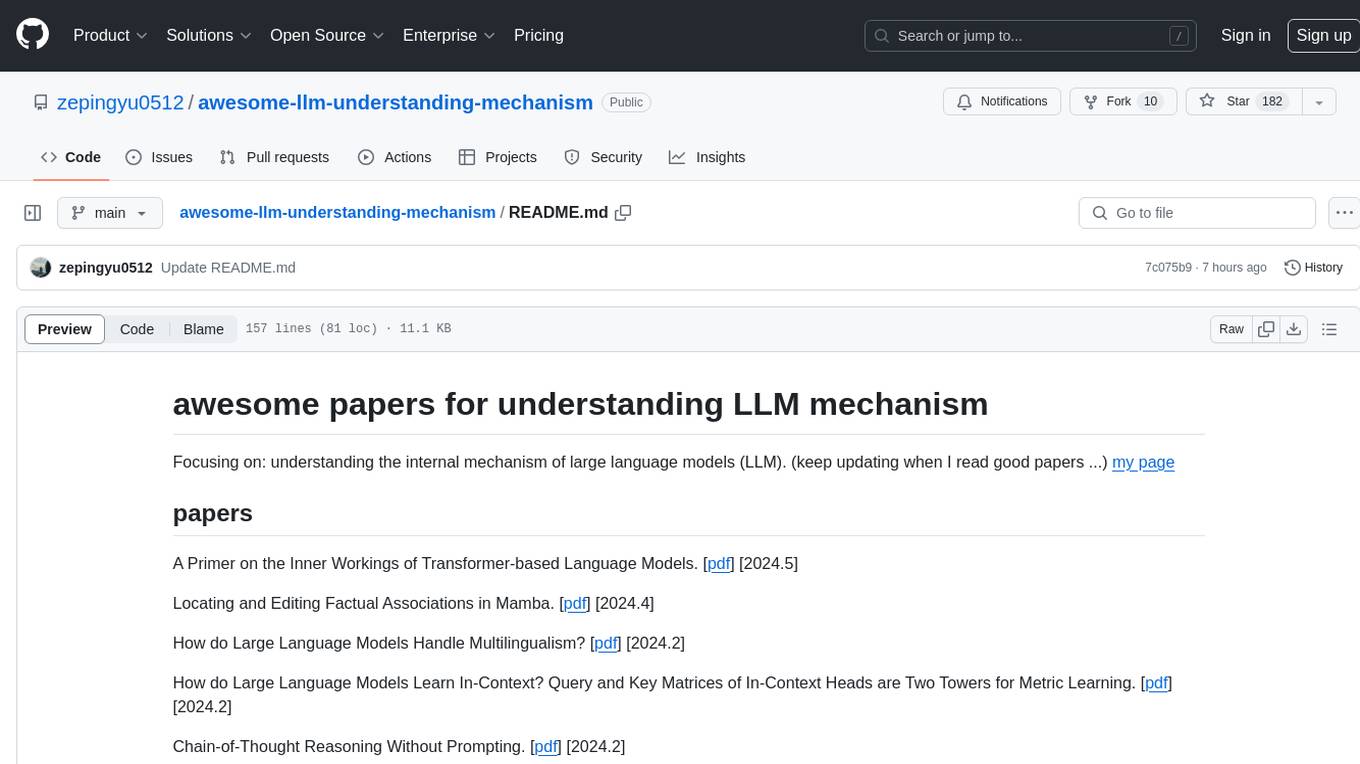
awesome-llm-understanding-mechanism
This repository is a collection of papers focused on understanding the internal mechanism of large language models (LLM). It includes research on topics such as how LLMs handle multilingualism, learn in-context, and handle factual associations. The repository aims to provide insights into the inner workings of transformer-based language models through a curated list of papers and surveys.
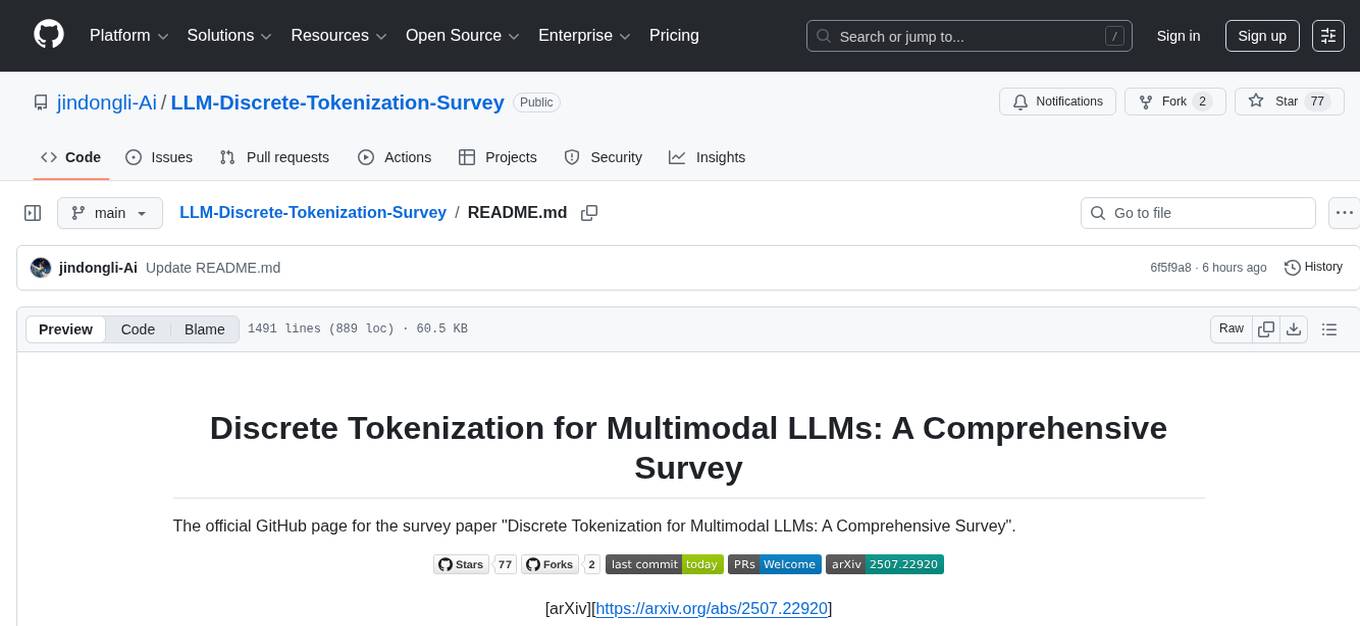
LLM-Discrete-Tokenization-Survey
The repository contains a comprehensive survey paper on Discrete Tokenization for Multimodal Large Language Models (LLMs). It covers various techniques, applications, and challenges related to discrete tokenization in the context of LLMs. The survey explores the use of vector quantization, product quantization, and other methods for tokenizing different modalities like text, image, audio, video, graph, and more. It also discusses the integration of discrete tokenization with LLMs for tasks such as image generation, speech recognition, recommendation systems, and multimodal understanding and generation.
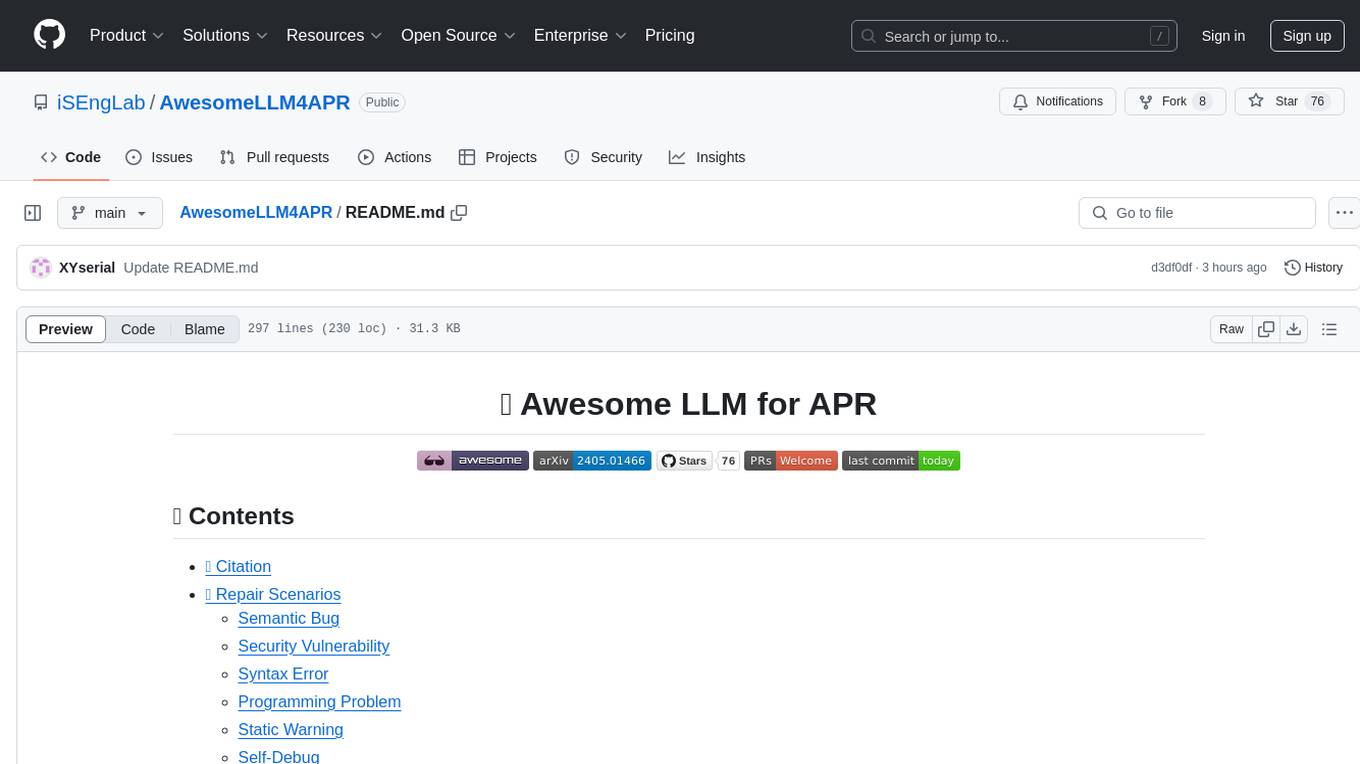
AwesomeLLM4APR
Awesome LLM for APR is a repository dedicated to exploring the capabilities of Large Language Models (LLMs) in Automated Program Repair (APR). It provides a comprehensive collection of research papers, tools, and resources related to using LLMs for various scenarios such as repairing semantic bugs, security vulnerabilities, syntax errors, programming problems, static warnings, self-debugging, type errors, web UI tests, smart contracts, hardware bugs, performance bugs, API misuses, crash bugs, test case repairs, formal proofs, GitHub issues, code reviews, motion planners, human studies, and patch correctness assessments. The repository serves as a valuable reference for researchers and practitioners interested in leveraging LLMs for automated program repair.
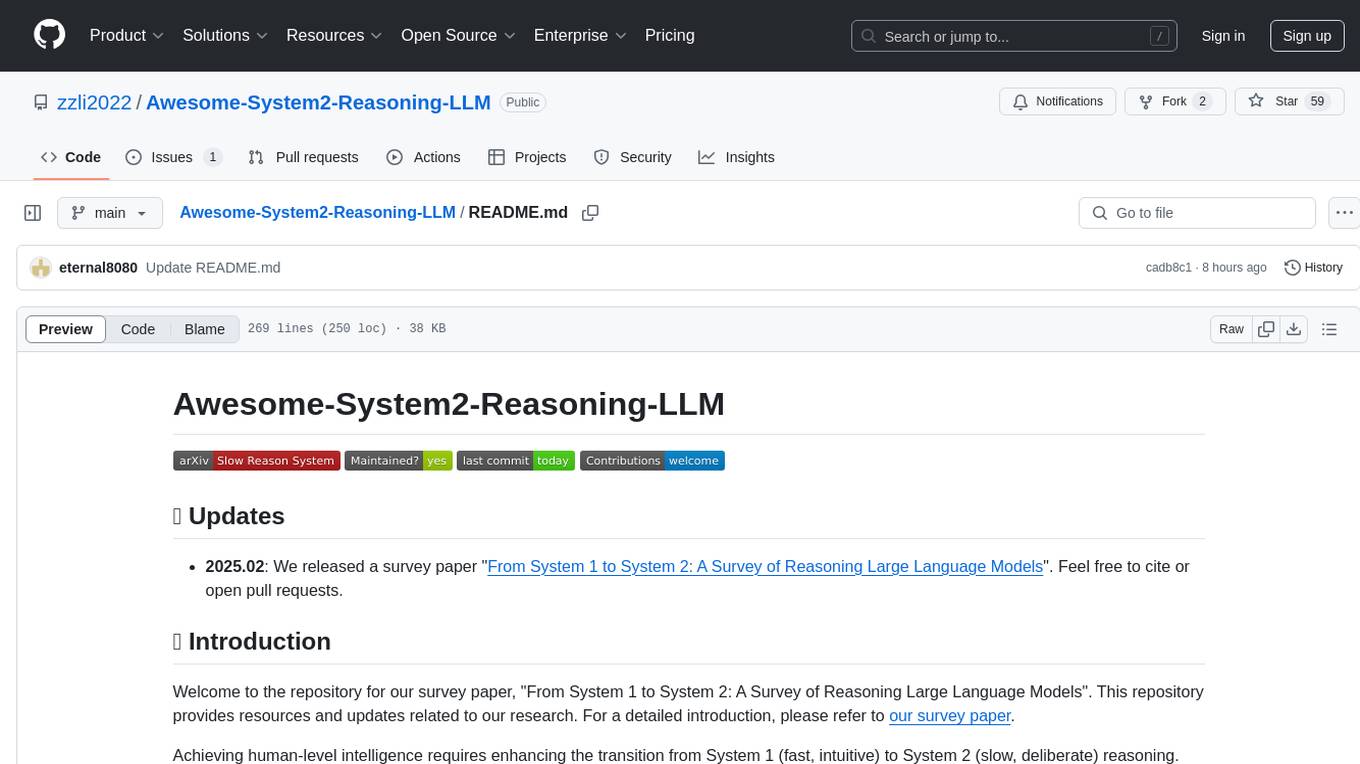
Awesome-System2-Reasoning-LLM
The Awesome-System2-Reasoning-LLM repository is dedicated to a survey paper titled 'From System 1 to System 2: A Survey of Reasoning Large Language Models'. It explores the development of reasoning Large Language Models (LLMs), their foundational technologies, benchmarks, and future directions. The repository provides resources and updates related to the research, tracking the latest developments in the field of reasoning LLMs.
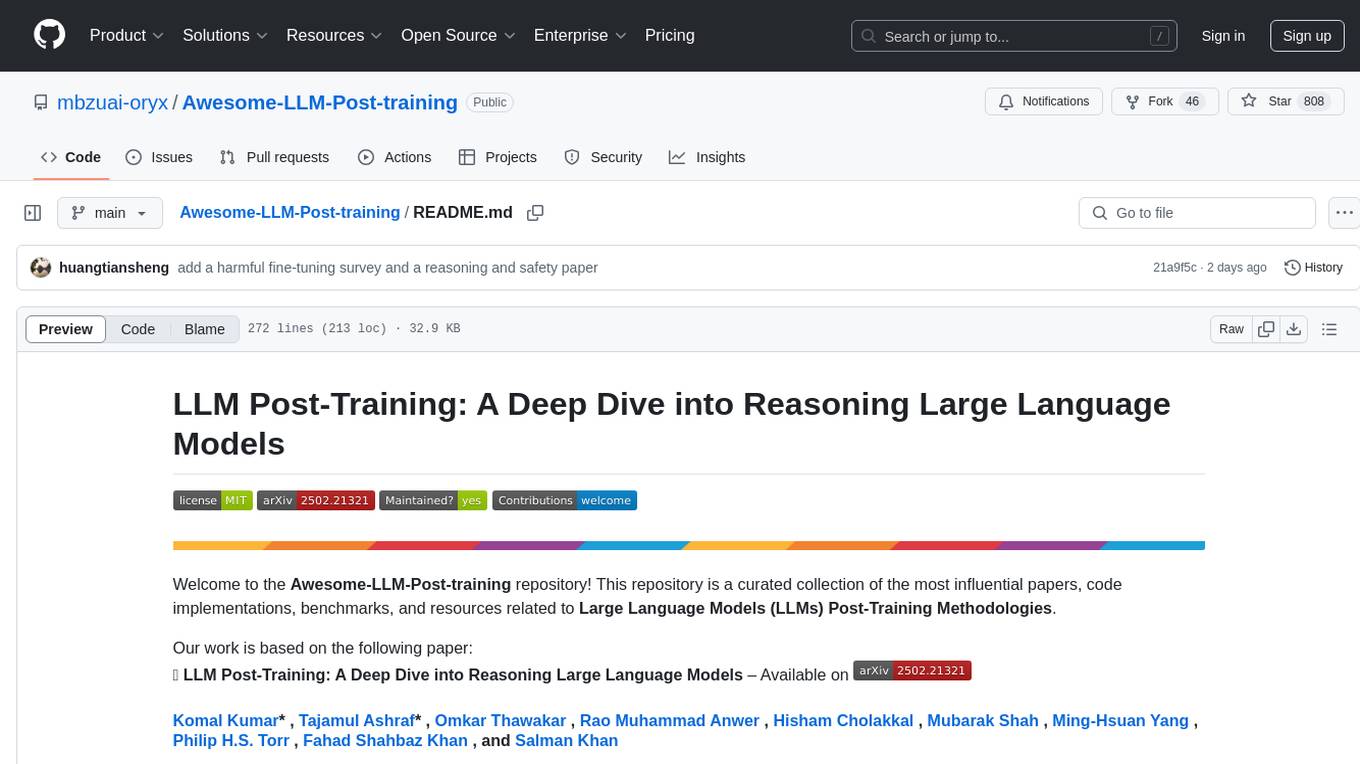
Awesome-LLM-Post-training
The Awesome-LLM-Post-training repository is a curated collection of influential papers, code implementations, benchmarks, and resources related to Large Language Models (LLMs) Post-Training Methodologies. It covers various aspects of LLMs, including reasoning, decision-making, reinforcement learning, reward learning, policy optimization, explainability, multimodal agents, benchmarks, tutorials, libraries, and implementations. The repository aims to provide a comprehensive overview and resources for researchers and practitioners interested in advancing LLM technologies.
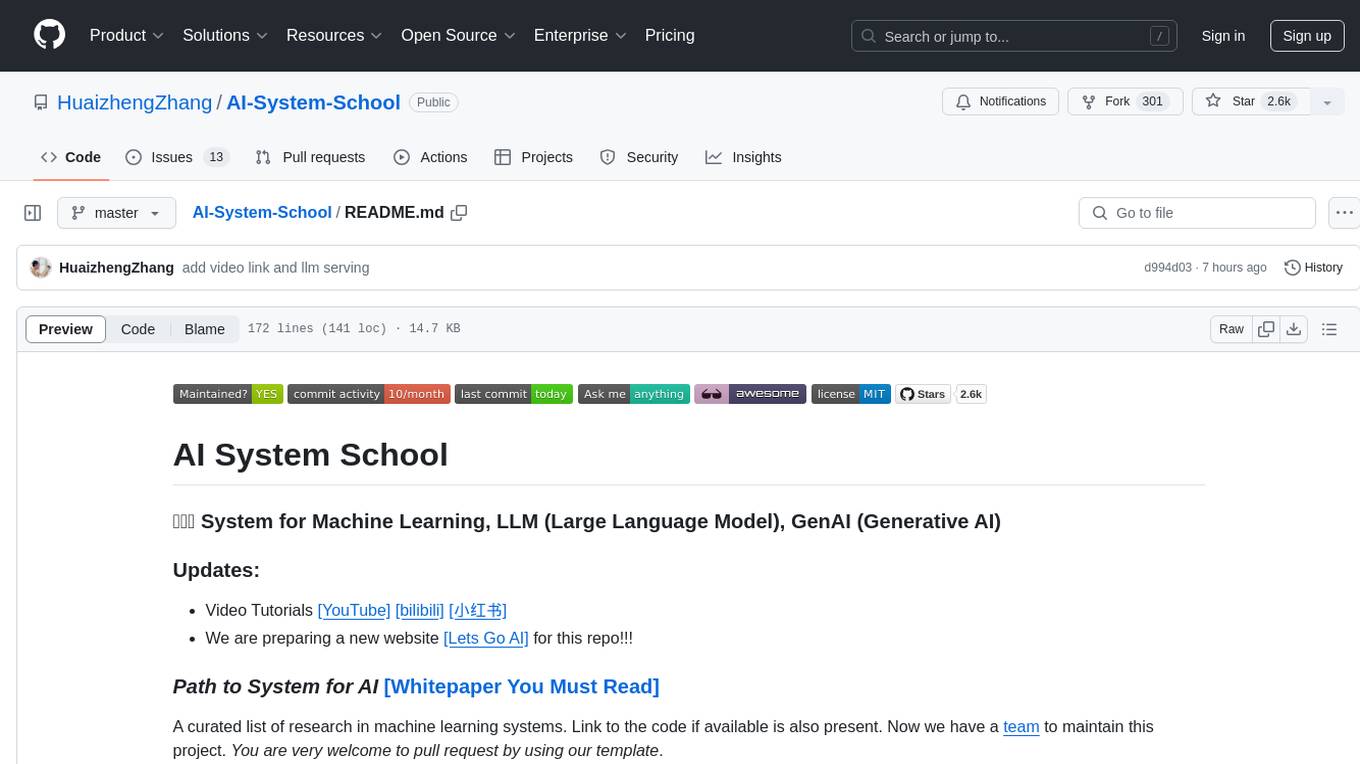
AI-System-School
AI System School is a curated list of research in machine learning systems, focusing on ML/DL infra, LLM infra, domain-specific infra, ML/LLM conferences, and general resources. It provides resources such as data processing, training systems, video systems, autoML systems, and more. The repository aims to help users navigate the landscape of AI systems and machine learning infrastructure, offering insights into conferences, surveys, books, videos, courses, and blogs related to the field.
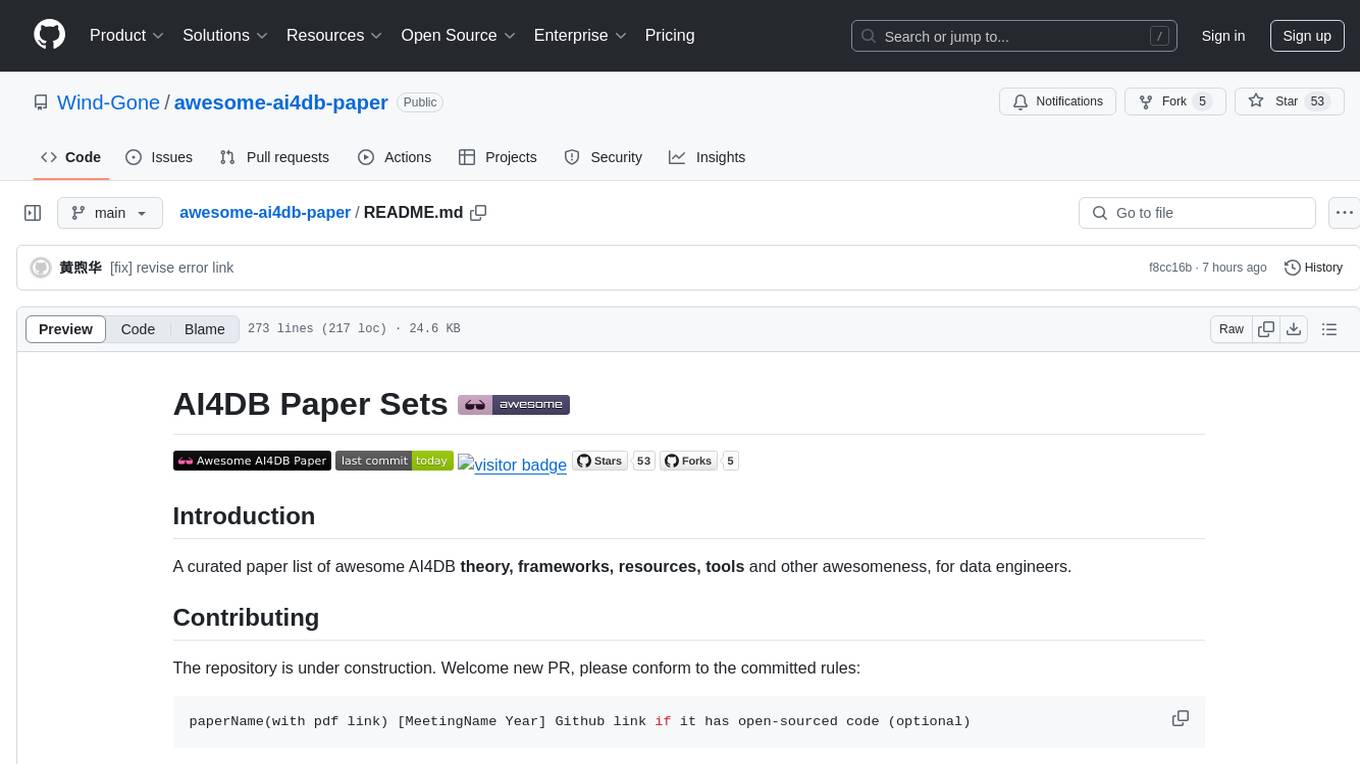
awesome-ai4db-paper
The 'awesome-ai4db-paper' repository is a curated paper list focusing on AI for database (AI4DB) theory, frameworks, resources, and tools for data engineers. It includes a collection of research papers related to learning-based query optimization, training data set preparation, cardinality estimation, query-driven approaches, data-driven techniques, hybrid methods, pretraining models, plan hints, cost models, SQL embedding, join order optimization, query rewriting, end-to-end systems, text-to-SQL conversion, traditional database technologies, storage solutions, learning-based index design, and a learning-based configuration advisor. The repository aims to provide a comprehensive resource for individuals interested in AI applications in the field of database management.
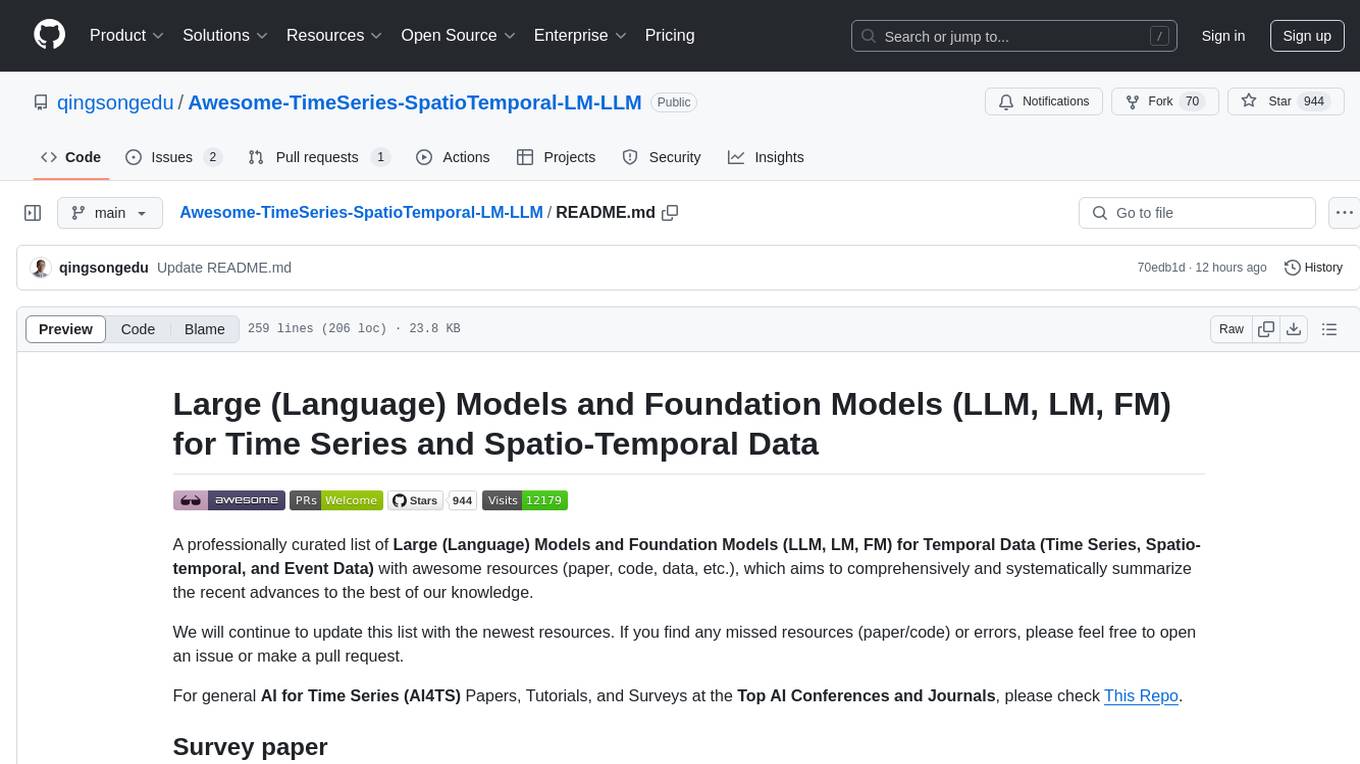
Awesome-TimeSeries-SpatioTemporal-LM-LLM
Awesome-TimeSeries-SpatioTemporal-LM-LLM is a curated list of Large (Language) Models and Foundation Models for Temporal Data, including Time Series, Spatio-temporal, and Event Data. The repository aims to summarize recent advances in Large Models and Foundation Models for Time Series and Spatio-Temporal Data with resources such as papers, code, and data. It covers various applications like General Time Series Analysis, Transportation, Finance, Healthcare, Event Analysis, Climate, Video Data, and more. The repository also includes related resources, surveys, and papers on Large Language Models, Foundation Models, and their applications in AIOps.
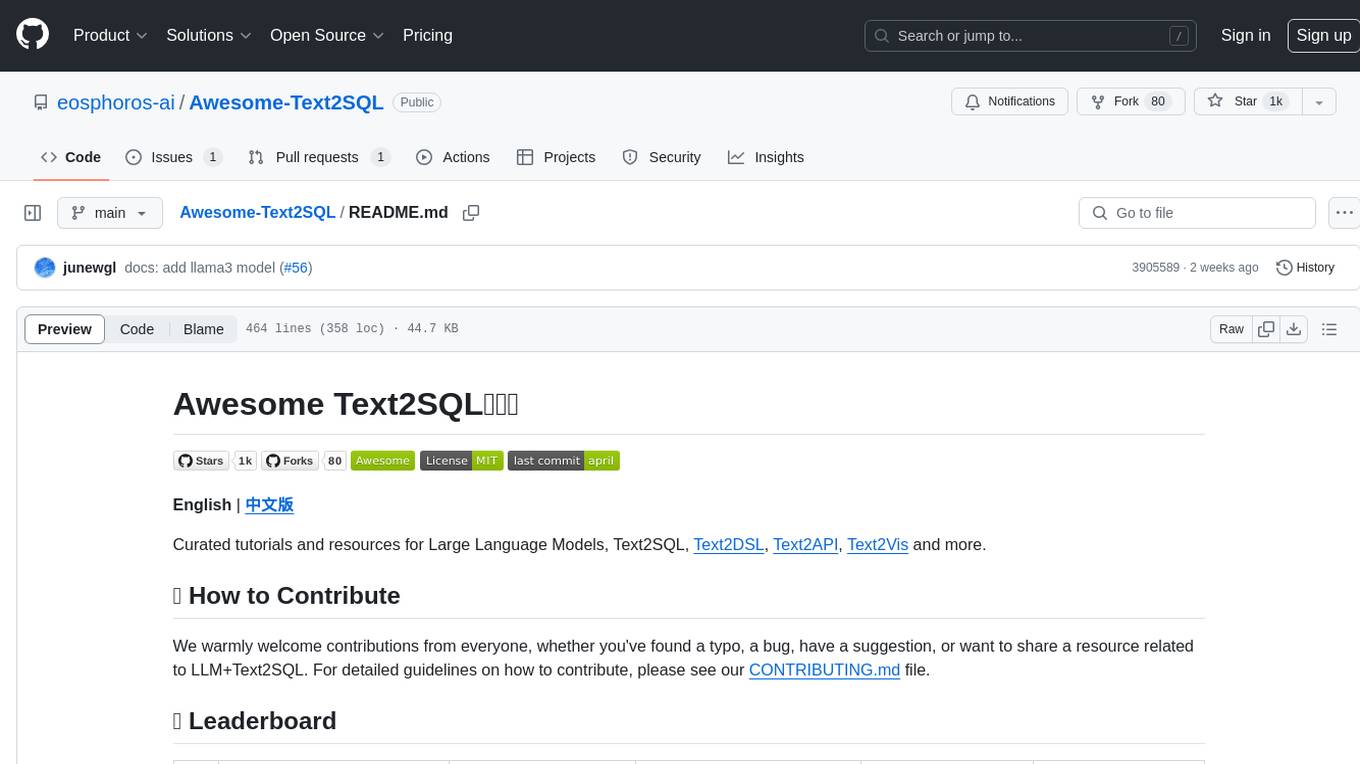
Awesome-Text2SQL
Awesome Text2SQL is a curated repository containing tutorials and resources for Large Language Models, Text2SQL, Text2DSL, Text2API, Text2Vis, and more. It provides guidelines on converting natural language questions into structured SQL queries, with a focus on NL2SQL. The repository includes information on various models, datasets, evaluation metrics, fine-tuning methods, libraries, and practice projects related to Text2SQL. It serves as a comprehensive resource for individuals interested in working with Text2SQL and related technologies.
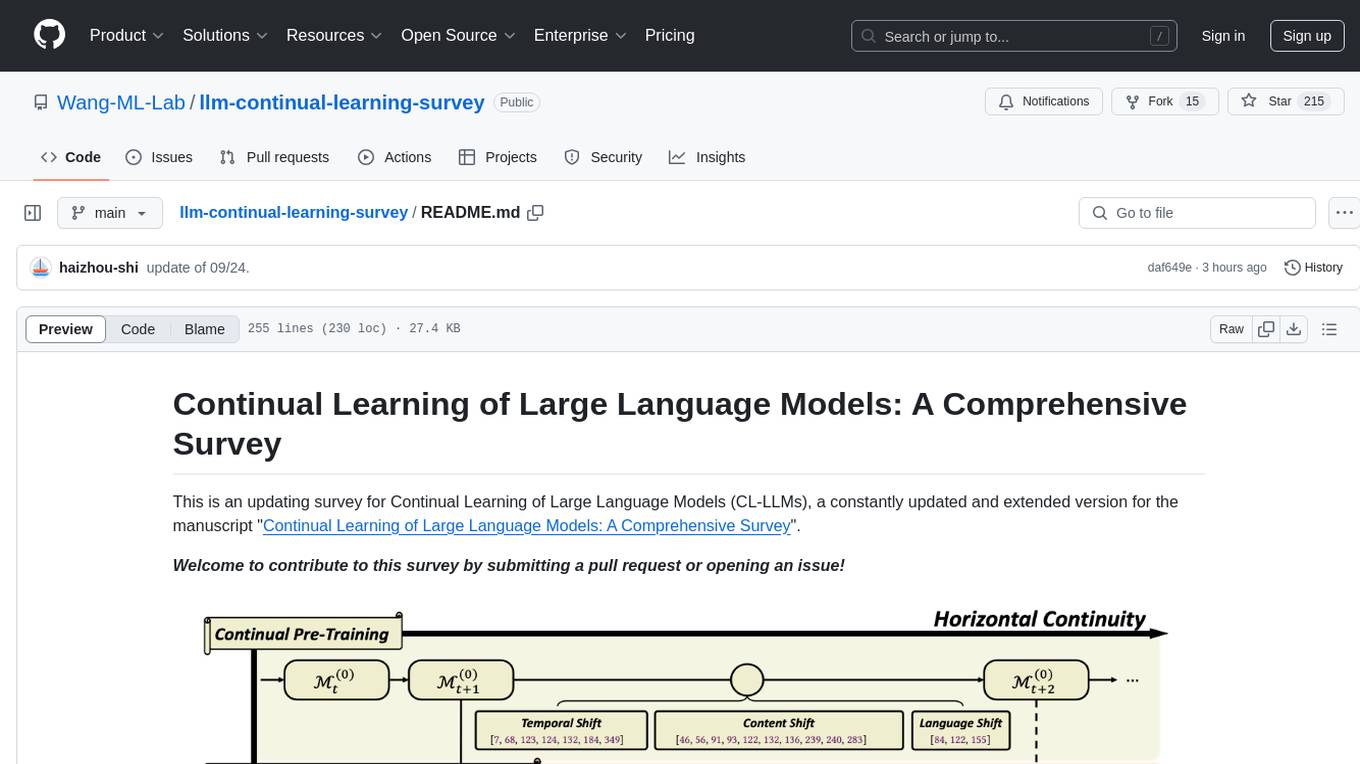
llm-continual-learning-survey
This repository is an updating survey for Continual Learning of Large Language Models (CL-LLMs), providing a comprehensive overview of various aspects related to the continual learning of large language models. It covers topics such as continual pre-training, domain-adaptive pre-training, continual fine-tuning, model refinement, model alignment, multimodal LLMs, and miscellaneous aspects. The survey includes a collection of relevant papers, each focusing on different areas within the field of continual learning of large language models.
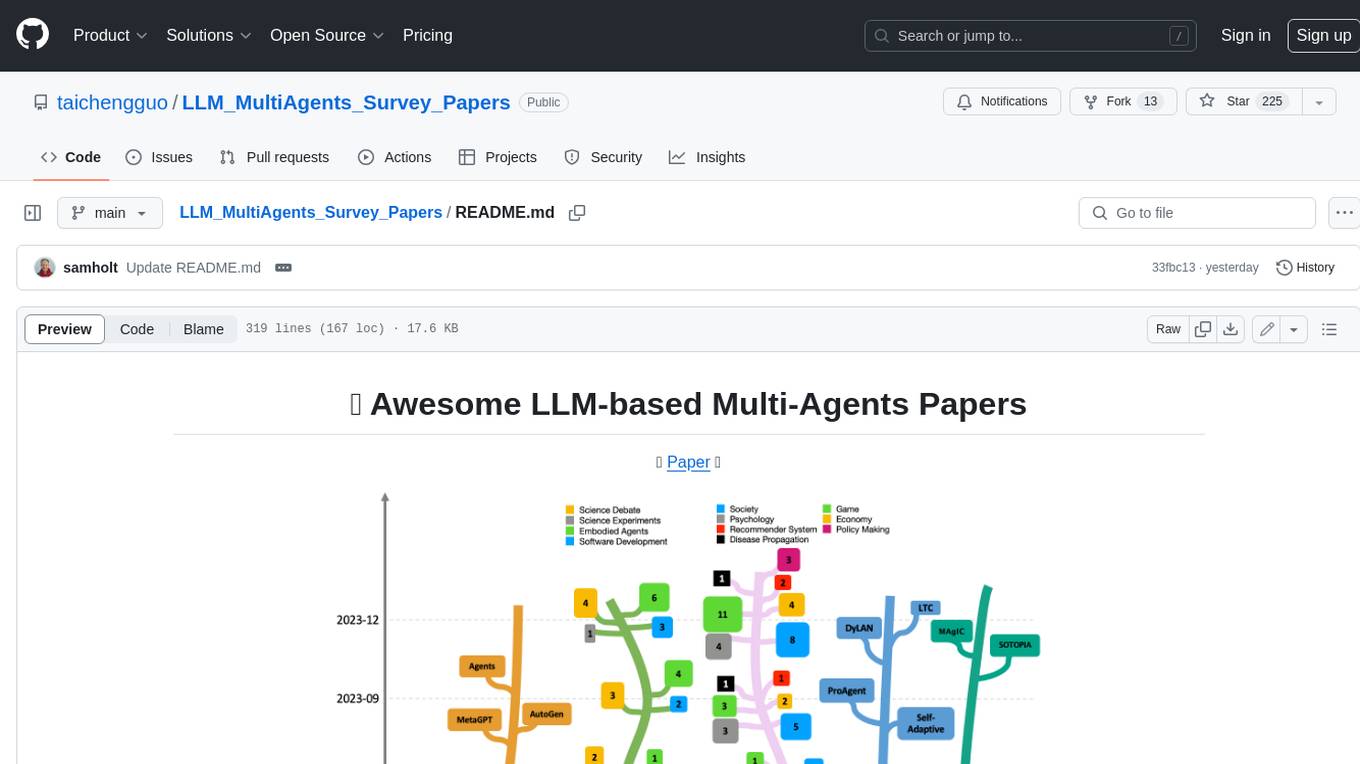
LLM_MultiAgents_Survey_Papers
This repository maintains a list of research papers on LLM-based Multi-Agents, categorized into five main streams: Multi-Agents Framework, Multi-Agents Orchestration and Efficiency, Multi-Agents for Problem Solving, Multi-Agents for World Simulation, and Multi-Agents Datasets and Benchmarks. The repository also includes a survey paper on LLM-based Multi-Agents and a table summarizing the key findings of the survey.
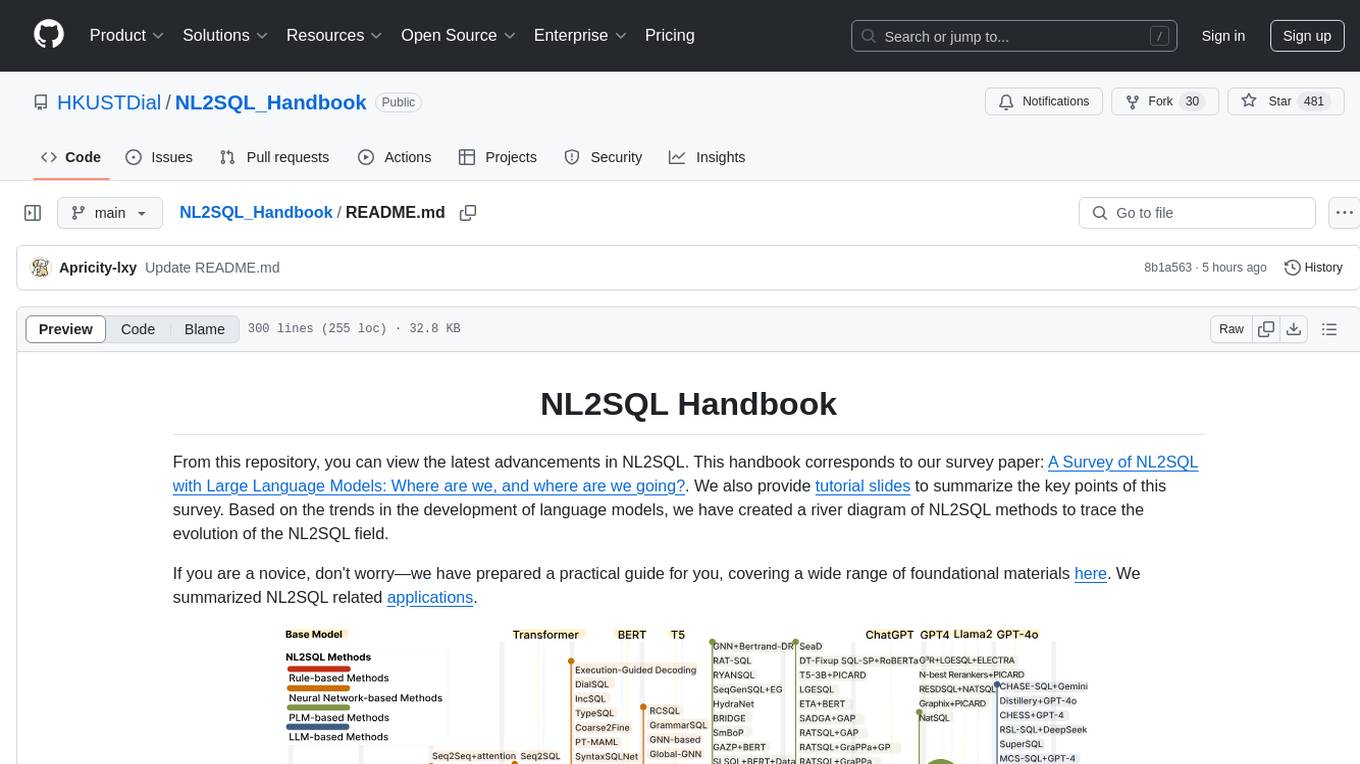
NL2SQL_Handbook
NL2SQL Handbook provides a comprehensive overview of Natural Language to SQL (NL2SQL) advancements, including survey papers, tutorial slides, and a river diagram of NL2SQL methods. It covers the evolution of NL2SQL solutions, module-based methods, benchmark development, and future directions. The repository also offers practical guides for beginners, access to high-performance language models, and evaluation metrics for NL2SQL models.
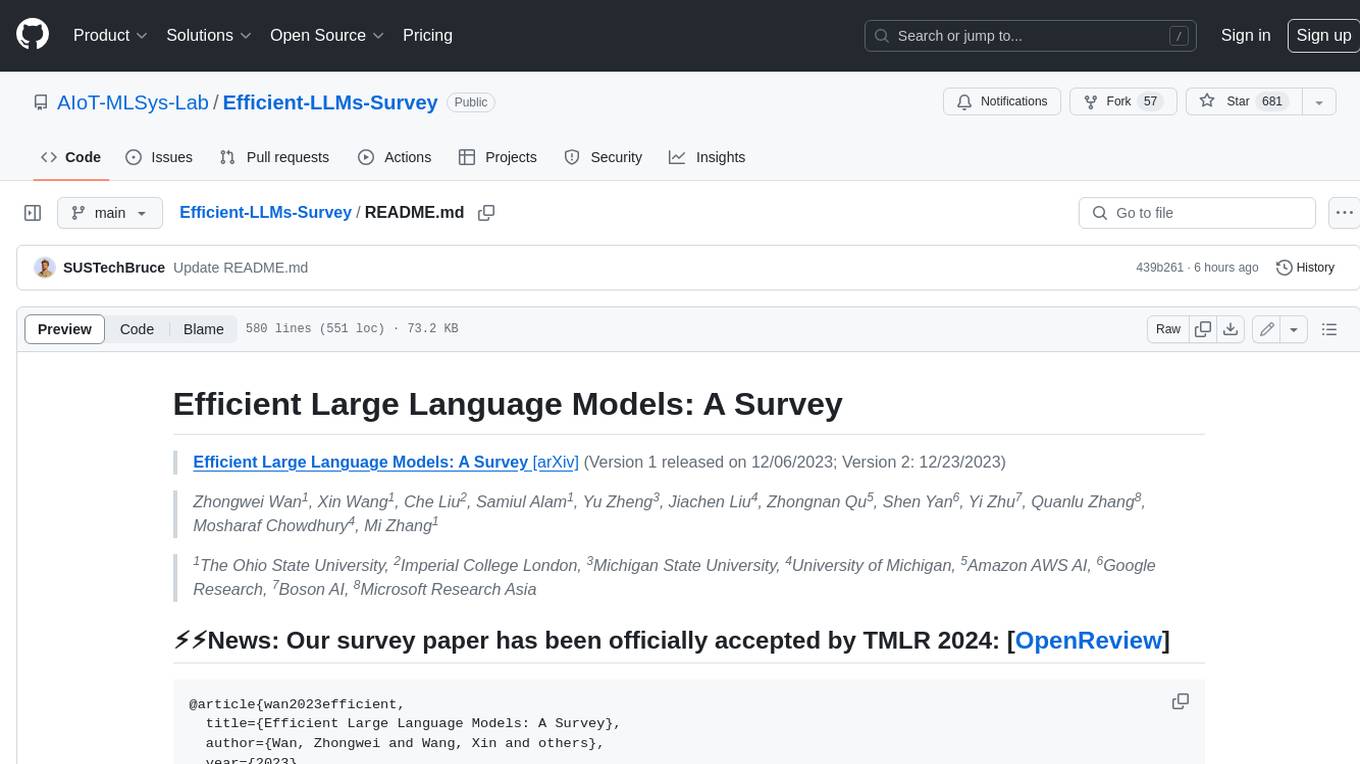
Efficient-LLMs-Survey
This repository provides a systematic and comprehensive review of efficient LLMs research. We organize the literature in a taxonomy consisting of three main categories, covering distinct yet interconnected efficient LLMs topics from **model-centric** , **data-centric** , and **framework-centric** perspective, respectively. We hope our survey and this GitHub repository can serve as valuable resources to help researchers and practitioners gain a systematic understanding of the research developments in efficient LLMs and inspire them to contribute to this important and exciting field.
For similar tasks

Azure-Analytics-and-AI-Engagement
The Azure-Analytics-and-AI-Engagement repository provides packaged Industry Scenario DREAM Demos with ARM templates (Containing a demo web application, Power BI reports, Synapse resources, AML Notebooks etc.) that can be deployed in a customer’s subscription using the CAPE tool within a matter of few hours. Partners can also deploy DREAM Demos in their own subscriptions using DPoC.

sorrentum
Sorrentum is an open-source project that aims to combine open-source development, startups, and brilliant students to build machine learning, AI, and Web3 / DeFi protocols geared towards finance and economics. The project provides opportunities for internships, research assistantships, and development grants, as well as the chance to work on cutting-edge problems, learn about startups, write academic papers, and get internships and full-time positions at companies working on Sorrentum applications.

tidb
TiDB is an open-source distributed SQL database that supports Hybrid Transactional and Analytical Processing (HTAP) workloads. It is MySQL compatible and features horizontal scalability, strong consistency, and high availability.

zep-python
Zep is an open-source platform for building and deploying large language model (LLM) applications. It provides a suite of tools and services that make it easy to integrate LLMs into your applications, including chat history memory, embedding, vector search, and data enrichment. Zep is designed to be scalable, reliable, and easy to use, making it a great choice for developers who want to build LLM-powered applications quickly and easily.

telemetry-airflow
This repository codifies the Airflow cluster that is deployed at workflow.telemetry.mozilla.org (behind SSO) and commonly referred to as "WTMO" or simply "Airflow". Some links relevant to users and developers of WTMO: * The `dags` directory in this repository contains some custom DAG definitions * Many of the DAGs registered with WTMO don't live in this repository, but are instead generated from ETL task definitions in bigquery-etl * The Data SRE team maintains a WTMO Developer Guide (behind SSO)

mojo
Mojo is a new programming language that bridges the gap between research and production by combining Python syntax and ecosystem with systems programming and metaprogramming features. Mojo is still young, but it is designed to become a superset of Python over time.

pandas-ai
PandasAI is a Python library that makes it easy to ask questions to your data in natural language. It helps you to explore, clean, and analyze your data using generative AI.

databend
Databend is an open-source cloud data warehouse that serves as a cost-effective alternative to Snowflake. With its focus on fast query execution and data ingestion, it's designed for complex analysis of the world's largest datasets.
For similar jobs

weave
Weave is a toolkit for developing Generative AI applications, built by Weights & Biases. With Weave, you can log and debug language model inputs, outputs, and traces; build rigorous, apples-to-apples evaluations for language model use cases; and organize all the information generated across the LLM workflow, from experimentation to evaluations to production. Weave aims to bring rigor, best-practices, and composability to the inherently experimental process of developing Generative AI software, without introducing cognitive overhead.

LLMStack
LLMStack is a no-code platform for building generative AI agents, workflows, and chatbots. It allows users to connect their own data, internal tools, and GPT-powered models without any coding experience. LLMStack can be deployed to the cloud or on-premise and can be accessed via HTTP API or triggered from Slack or Discord.

VisionCraft
The VisionCraft API is a free API for using over 100 different AI models. From images to sound.

kaito
Kaito is an operator that automates the AI/ML inference model deployment in a Kubernetes cluster. It manages large model files using container images, avoids tuning deployment parameters to fit GPU hardware by providing preset configurations, auto-provisions GPU nodes based on model requirements, and hosts large model images in the public Microsoft Container Registry (MCR) if the license allows. Using Kaito, the workflow of onboarding large AI inference models in Kubernetes is largely simplified.

PyRIT
PyRIT is an open access automation framework designed to empower security professionals and ML engineers to red team foundation models and their applications. It automates AI Red Teaming tasks to allow operators to focus on more complicated and time-consuming tasks and can also identify security harms such as misuse (e.g., malware generation, jailbreaking), and privacy harms (e.g., identity theft). The goal is to allow researchers to have a baseline of how well their model and entire inference pipeline is doing against different harm categories and to be able to compare that baseline to future iterations of their model. This allows them to have empirical data on how well their model is doing today, and detect any degradation of performance based on future improvements.

tabby
Tabby is a self-hosted AI coding assistant, offering an open-source and on-premises alternative to GitHub Copilot. It boasts several key features: * Self-contained, with no need for a DBMS or cloud service. * OpenAPI interface, easy to integrate with existing infrastructure (e.g Cloud IDE). * Supports consumer-grade GPUs.

spear
SPEAR (Simulator for Photorealistic Embodied AI Research) is a powerful tool for training embodied agents. It features 300 unique virtual indoor environments with 2,566 unique rooms and 17,234 unique objects that can be manipulated individually. Each environment is designed by a professional artist and features detailed geometry, photorealistic materials, and a unique floor plan and object layout. SPEAR is implemented as Unreal Engine assets and provides an OpenAI Gym interface for interacting with the environments via Python.

Magick
Magick is a groundbreaking visual AIDE (Artificial Intelligence Development Environment) for no-code data pipelines and multimodal agents. Magick can connect to other services and comes with nodes and templates well-suited for intelligent agents, chatbots, complex reasoning systems and realistic characters.

